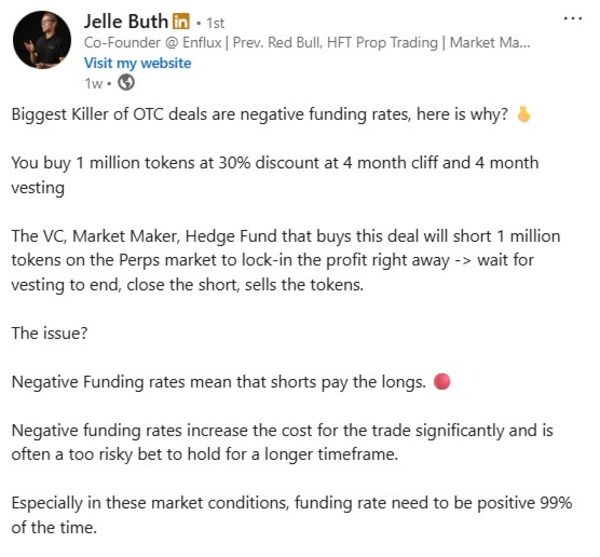🏦 OTC Token Deals: Why Funds Lock in 100%+ APY While Retail Eats the Risk
-

Behind the scenes, crypto funds and market makers are printing double-digit returns through over-the-counter (OTC) token deals — while retail traders get stuck with the volatility and sell pressure.Here’s how the game works

 The Mechanics of an OTC Deal
The Mechanics of an OTC DealA VC or fund buys tokens at a 30% discount with a 3–4 month vesting.
To hedge, they short the same amount in perpetual futures markets.
When tokens unlock, the discount + hedge guarantees a profit — often 60–120% annualized, no matter where the token price goes.
“I would never want to be retail again,” says Jelle Buth, co-founder of market maker Enflux (which also plays this game).
 Why Retail Gets Wrecked
Why Retail Gets WreckedProjects announce “$X million raised” but rarely disclose that the raise included discounted tokens with short vesting.
When unlocks hit, selling pressure crushes spot markets.
Retail traders are effectively trading blind against insiders holding stacks they got cheap.
Douglas Colkitt (Fogo):
“If you’re trading a token and don’t know there’s a pile of discounted paper waiting to dump, you’re just trading blind.”
 Isn’t This Just TradFi Playbook?
Isn’t This Just TradFi Playbook?Yes — it mirrors convertible bond arbitrage in equities, except with zero disclosure.
In TradFi: filings + restrictions.
In crypto: no filings, no transparency, just insiders farming yield.
Lawyer Yuriy Brisov:
“It’s not illegal, but equities live inside a wall of disclosure rules. In crypto, projects can quietly structure deals however they want.”
 The Catch for Funds
The Catch for FundsThese aren’t 100% free lunches:
Funding fees on perps eat into profits if shorts are expensive.
Opportunity cost → capital locked in vesting could be deployed elsewhere.
Still, when returns annualize to ~90% APY, the math usually works. Why OTC Persists
Why OTC PersistsProjects → Get instant liquidity without nuking token price.
Funds → Get predictable yield instead of long, illiquid equity bets.
Retail → Left guessing when unlocks and hedges distort price action.
Buth:
“Many VCs don’t bother with pre-seed anymore. They’d rather take liquid token deals with 60–80% APY than wait years for an equity exit.”
 Can Retail Ever Play?
Can Retail Ever Play?Some fundraising platforms now list OTC deals publicly, letting retail buy into what used to be insider-only rounds.
But transparency is still thin. Token unlock schedules, discounts, and hedges remain hidden drivers of price.
Best defense for retail: assume hidden sell pressure exists and trade accordingly.
 Big Picture
Big PictureOTC deals aren’t going away. They’re too profitable for funds and too convenient for projects.
For retail, the only winning move is awareness: know when you’re up against discounted stacks and adapt your strategy before you get dumped on. What’s your take?
What’s your take?Should OTC deals for tokens require mandatory disclosure, like in TradFi?
Or is this just the natural free market at work — insiders play the game, and retail has to wise up?






















 ️🪙
️🪙